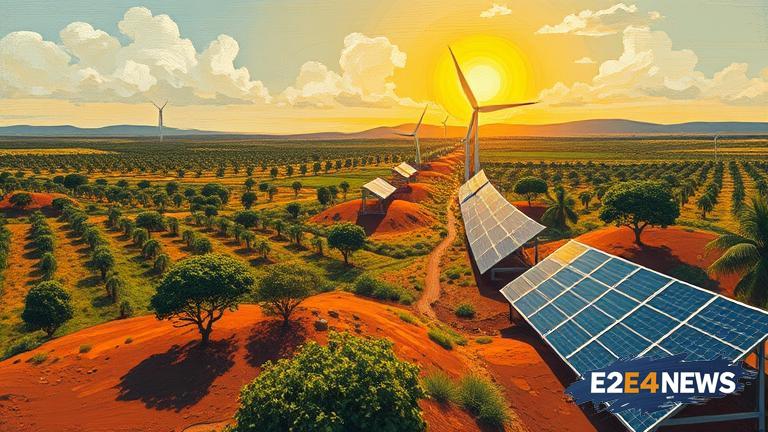The African continent is witnessing a significant shift towards renewable energy, driven by the need to address the pressing issues of energy access, energy security, and climate change. With many countries still struggling to provide reliable and affordable electricity to their citizens, renewable energy has emerged as a viable solution. Solar and wind power are leading the charge, with countries like South Africa, Egypt, and Morocco investing heavily in these sectors. The cost of renewable energy technologies has decreased dramatically over the years, making them more competitive with fossil fuels. This has led to a surge in investment, with international organizations and private companies pouring billions of dollars into African renewable energy projects. The African Development Bank has been at the forefront of this effort, providing financing and technical assistance to countries looking to develop their renewable energy sectors. The bank’s ‘Desert to Power’ initiative, for example, aims to develop 10,000 megawatts of solar power in the Sahel region by 2025. Other organizations, such as the International Renewable Energy Agency (IRENA) and the United Nations Environment Programme (UNEP), are also working to support the development of renewable energy in Africa. The benefits of renewable energy are numerous, including reduced greenhouse gas emissions, improved air quality, and enhanced energy security. Additionally, renewable energy can create jobs and stimulate local economies, contributing to sustainable development and poverty reduction. However, despite the progress made, significant challenges remain, including the need for greater investment, better infrastructure, and more effective policies and regulations. Many African countries still lack the necessary frameworks to support the development of renewable energy, and the lack of access to financing remains a major obstacle. Nevertheless, the momentum behind Africa’s renewable energy revolution is building, with more and more countries committing to ambitious targets and investing in renewable energy projects. Kenya, for example, has set a target of generating 70% of its electricity from renewable sources by 2030, while Ghana is aiming to increase its renewable energy capacity to 10% of its total energy mix by 2025. The private sector is also playing a crucial role, with companies like Vestas and Siemens Gamesa investing in wind and solar projects across the continent. As the demand for energy continues to grow, driven by rapid urbanization and economic development, the need for renewable energy will only become more pressing. The African continent has the potential to become a global leader in renewable energy, with its vast natural resources and growing demand for power. With the right policies, investments, and technologies in place, Africa can unlock its full potential and achieve a sustainable, renewable energy-powered future. The transition to renewable energy will not be easy, and it will require careful planning, coordination, and cooperation among governments, international organizations, and the private sector. However, the rewards will be significant, including reduced carbon emissions, improved energy security, and enhanced economic development. As the world looks to Africa as a key player in the global transition to renewable energy, the continent is poised to take center stage in the fight against climate change. With its abundant natural resources, growing economies, and increasing demand for energy, Africa is well-placed to become a hub for renewable energy development and investment. The future of energy in Africa is renewable, and it is an exciting time for the continent as it embarks on this journey towards a sustainable, energy-secure future.
